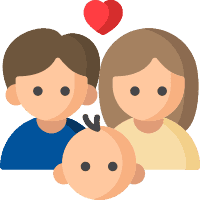At two years of age, your little one is officially a toddler! You’re probably running to keep up with their boundless energy and enthusiasm as they explore and play. It’s exciting to watch toddlers learn and have new experiences. One of the gifts your child can offer you is a renewed sense of wonder at the little things around us we often take for granted.
Here are some two year old milestones to look out for as your child matures. Of course, every little one grows at their own pace and reaches milestones in their own time. Your toddler might have already mastered some of these skills long before their second birthday. Others might take a little longer to achieve milestones.
Movement, Sensory, and Motor Milestones
Toddlers seem to gain motor coordination by leaps and bounds in this stage of development. Most children around this age experience significant progress in their gross and fine motor skills (large muscle and small muscle movement).
Mobility
Kids are usually walking confidently and beginning to fast walk by around 18 months. Enjoy watching your little one learn to jump with both feet, climb on playground equipment (and perhaps the furniture), and walk up stairs while holding onto the railing or your hand for stability.
Most children in this developmental stage enjoy pulling or carrying toys with them while walking around. Your little one may try to carry large toys or several toys at once. They are also likely learning to kick a ball and throw a ball overhand. Most toddlers also begin learning to catch a ball with both hands around this age.
Climbing on playground equipment and playing fun games with bubbles are excellent for developing mobility and gross motor skills. It’s not easy to predict where bubbles will go, so children can run, jump, zigzag, and move in ways that require shifting their weight and balance.
Sensory and motor skills
Your toddler should be able to accomplish more daily tasks on their own, like trying to pull their own clothes up and down. They are probably also working hard to button, snap, and zip their own clothing but they usually need some assistance.
Around age two, kids usually develop the ability to do things like turn on the faucet, wash their hands with a little help, and use a toothbrush and hairbrush.
In play, your child should be able to turn over containers to pour out the contents, make block towers with at least two blocks, and put small objects, like Cheerios, into a bottle. Kids at this age should also be able to put larger, coin-shaped items through slots. These are signs your little one is learning to make small, controlled movements with their hands and arms that require concentration, precision, and hand-eye coordination.
Another two year old milestone in their fine-motor skills is being able to scribble with crayons or other coloring tools. Your child probably also enjoys turning the pages of books two or three at a time, which requires small movements with their fingers and hands. You might notice your toddler using one hand more than the other, though this is not true of every child.
Hearing, language, and emotional development
Every kid learns to talk and communicate at their own pace. By two years old, your toddler’s vocabulary should be around 75 words. Most children at this age expand their vocabulary quickly as they imitate words they hear around them. Your little one should also begin combining words into simple two or three-word phrases.
Hearing and language milestones
By their second birthday, kids should be able to identify familiar people, body parts, and toys by pointing to them when you name them. They are usually able to name items in picture books, like birds, cats, dogs, and other animals or favorite things.
Your child should also be able to follow simple verbal instructions like “go get your shoes,” or “throw it away,” and “help put the toys in the bin.”
Most toddlers are also able to use speech-gestures appropriately, like waving hello and goodbye and holding their arms up to communicate wanting to be picked up.
Cognitive milestones
Around age two, many children begin to engage in make-believe play, like caring for a baby doll, pretending to cook, or talking on a toy telephone. Kids also move from “peek-a-boo” games to “hide-and-seek” style games where they can find objects that are hidden in easy spots (like under two or three blankets).
Your child might also begin to sort objects by shape and color. Games that encourage your little one to group things by type, size, or color are fun and helpful. Three to four-piece puzzles are excellent for cognitive and fine-motor skill development at this age, though most children will need some encouragement and help to complete the tasks.
Social and emotional development
Toddlers usually enjoy looking at picture books and they should be able to sit and listen to short stories. Your little one should be able to engage with the story by pointing to a few items on a page when you name them (like specific animals or cars). They can probably also point to a few of their own body parts and identify themselves in a mirror.
One way children learn is by imitating. You may notice that your toddler copies other peoples’ actions, expressions, and even words, especially adults and older children.
When in group settings, your child likely parallel play next to other children. Instead of ignoring other children, some kids begin to include others in their play in very loosely organized ways, like in games of chase. Children at this age are usually eager to be around other kids but they are still developing cooperative skills like sharing.
Another aspect of cognitive development is gaining more independence. Your child should want to do more things for themselves and begin to express opinions. This can also lead to more defiant behavior when your little one tries to do what you told them not to, or refuses to do something.
Your child probably uses the word “no” frequently as a way to assert themselves. Even though this is frustrating, it’s part of their cognitive, social, and emotional development.
Feeding
Nutrition is a critical factor in your child’s development. It’s important to help your child eat the right foods to support healthy physical, mental, psychological, and even emotional development.
By two years old, your little one is probably a delightfully messy addition to your family’s regular meal time.
Your child should enjoy eating a variety of foods with different tastes and textures. As their fine motor skills develop, one major two year old milestone is the ability to feed themselves with a spoon. However, you’ll probably notice your toddler still using their fingers frequently.
Kids at this age should be able to drink from a straw or an open cup. Sippy cups are not ideal for your toddler’s oral development and parents should try hard to avoid them. Open cups and straws are perfect, and water bottles with “pop tops” are acceptable alternatives to the ever-popular sippy cup.
Toddlers usually eat small meals throughout the day, and it’s normal for some children to eat a little less at certain times during this stage of development. Don’t be alarmed if you notice more fussy eating and erratic food preferences.
When to be concerned
Remember, every child develops at their own pace. It’s impossible to tell when every child will master a specific skill. Don’t be concerned if your toddler takes a little longer to reach some of the two year-old milestones.
Consider speaking to your pediatrician if your baby does not reach these milestones by their second birthday:
- Walking by about 18 months
- Develops a heel-toe walking pattern after several months of walking
- Has a vocabulary of at least 15 words
- Speaks two-word sentences
- Understands how to use everyday items like hairbrushes, telephones, and utensils
- Follows simple directions
- Drinks from a cup independently
- Uses speech-gestures appropriately (like waving hello and goodbye)
The friendly staff at the Center for Speech & Language Development can support you and your child through every stage of development. Our goal is to provide holistic care to help your little one reach appropriate developmental benchmarks and ensure parents and caregivers receive excellent support and resources throughout the process. Contact us today to learn more about our speech, developmental, and nutritional services or to schedule a consultation.


